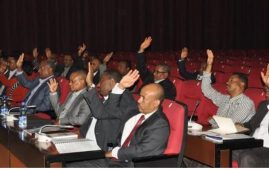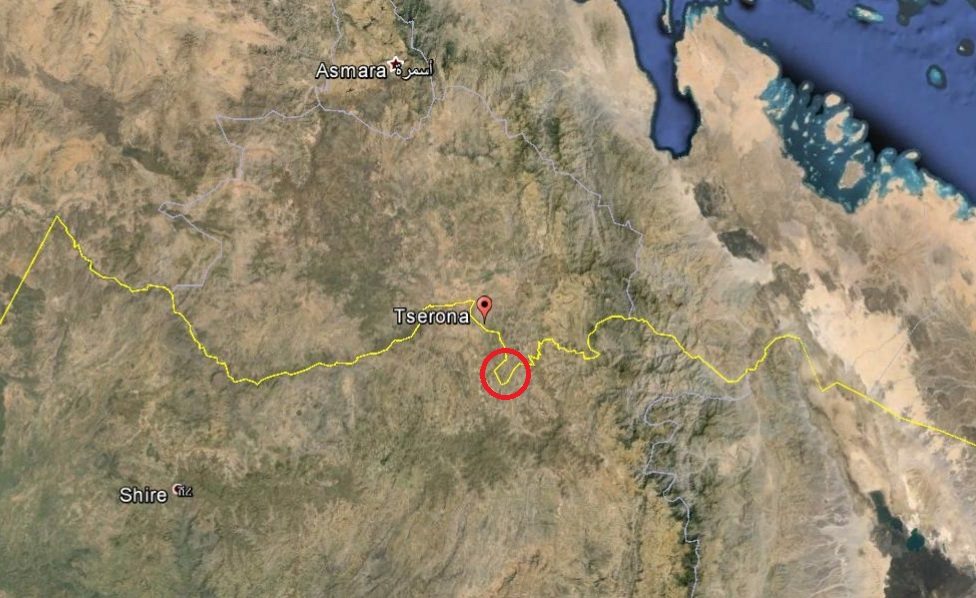Destabilizing the region is not the only factor that earned Eritrea the title Africa’s North Korea, but also information blackout.
There is no independent source of information in the country, except, of course, a journalist by the name Mountain whose accounts barely distinguishable from those of the Ministry of Information.
However, a leaked Cable of US Embassy Asmara provides a first hand observation of the state of economy in the major port town Massawa, which lies alongside the Read Sea.
The January 2009 Cable states:
[Embassy officials] traveled to Massawa January 14-15 for a Public Diplomacy engagement (septel) and observed a more hollow, destitute city than we saw in April 2008.
The Cable notes that
[Massawa] known for its excellent snorkeling, picturesque islands, and overall relaxing atmosphere. Now, however, the city is also defined by shuttered shops and empty streets.
The Embassy officials present their personal observation as follows:
The owner of a dive shop, not used to mid-week visitors in Massawa, had to be called from his home to rent a boat. A shopkeeper had to be called to show us her wares.
The Red Sea Hotel, the city’s largest and arguably nicest existing hotel, is a ghost town. Of the 15 rooms with guests, Embassy staff occupied eight. International visitors occupied only two of the remaining seven, one from Mogadishu and one from Finland.
More depressingly, the Cable notes that:
the Massawa economy has contracted to the point that….the streets were devoid of even beggars, much less shop owners.
Read the full text below.
******************
Reference ID – 09ASMARA25
Created – 2009-01-21 10:47
Released – 2011-08-26 00:00
Classification – UNCLASSIFIED//FOR OFFICIAL USE ONLY
Origin – Embassy Asmara
VZCZCXRO1294
RR RUEHROV
DE RUEHAE #0025/01 0211047
ZNR UUUUU ZZH
R 211047Z JAN 09
FM AMEMBASSY ASMARA
TO RUEHC/SECSTATE WASHDC 0113
INFO RUCNIAD/IGAD COLLECTIVE
RUEKJCS/SECDEF WASHDC
RHEHNSC/NSC WASHDC
RUEAIIA/CIA WASHDC
RUEKDIA/DIA WASHDC
RUMICEA/JICCENT MACDILL AFB FL
RUEPADJ/CJTF-HOA J2X CAMP LEMONIER DJ
RUZEFAA/HQ USAFRICOM STUTTGART GE
RHRMDAB/COMUSNAVCENT
UNCLAS SECTION 01 OF 02 ASMARA 000025
SENSITIVE
SIPDIS
DEPT FOR AF/E AND GEORGIANNA PLATT FOR USAID
LONDON AND PARIS FOR AFRICA WATCHERS
E.O. 12958: N/A
TAGS: ECON SOCI PGOV ER
SUBJECT: MASSAWA’S ECONOMY DWINDLES
¶1. (SBU) SUMMARY: Emboffs traveled to Massawa January 14-15 for a Public Diplomacy engagement (septel) and observed a more hollow, destitute city than we saw in April 2008. Although the city’s vice mayor remained optimistic about the city’s situation, the evidence on the ground suggested a more bleak scenario. Emboffs also visited an entrepreneurial Massawa resident making some headway in the city’s shrinking economy. End Summary.
ON BECOMING A GHOST TOWN
————————
¶2. (SBU) The city of Massawa is known for its excellent snorkeling, picturesque islands, and overall relaxing atmosphere. Now, however, the city is also defined by shuttered shops and empty streets. The owner of a dive shop, not used to mid-week visitors in Massawa, had to be called from his home to rent a boat. A shopkeeper had to be called to show us her wares. The Red Sea Hotel, the city’s largest and arguably nicest existing hotel, is a ghost town. Of the 15 rooms with guests, Embassy staff occupied eight. International visitors occupied only two of the remaining seven, one from Mogadishu and one from Finland. The hotel has little to attract international tourists in any case. The swimming pool has been under renovation for years, the restaurant fare is mediocre, and the bathrooms squalid. Massawa’s deputy mayor, Yosef Gebremariam, nevertheless was optimistic about Massawa’s future, claiming at least three new luxury hotels will open by the summer months. However, Embassy staff observed no progress had been made since April last year on two of the hotels, one of which is still an empty shell.
GOTTA KEEP ON KEEPIN’ ON
————————
¶3. (SBU) Emboffs met with a former USAID micro-credit recipient, Ms. Aminah. A former fighter in the liberation struggle, Aminah first went into business in the 1990s baking and selling bread. Later, she branched out into sandwiches and eventually also sold beer. Some of her neighbors disapproved of a Muslim woman selling beer and warned her to stop. When she did not, they burned her business down. She then received a micro-credit loan from USAID through the GSE, for a large tent hotel. Unfortunately, it was destroyed in a storm and she still owes the GSE 50,000 Nakfa (US$3,333). She now tries to operate a sandwich shop, cleverly housed in an old Antonov aircraft, which she rents from the Ministry of Tourism for 1,500 nakfa (US$100) a month. When she was unable to buy sandwich bread, she built a brick oven and produced her own. Unfortunately, while Aminah is able to sell coffee and tea, she has not had a sandwich customer in over a year and awaits the yearly Fenkel celebration in February for her business to temporarily pick up. In the meantime, she pays her rent by traveling to the surrounding mountains to purchase goats and later re-selling them in the lowlands for a 28 percent profit. Aminah feeds her family (husband, daughter, and three grandchildren) from her spacious garden of tomatoes, corn, peppers, and sorghum, using the corn husks and some of the sorghum as feed for the goats. Aminah is hardworking and willing to take calculated risks to improve her livelihood. She would be a prime candidate for technical assistance from the government or an NGO. Although her garden was doing well, it was clear she could use some advice on how to promote her sandwich shop and how to raise goats– two newborn kid goats were being ignored by their mothers and seemed unlikely to survive.
WHERE DID THE PEOPLE GO
———————–
¶4. (SBU) When asked where all the people in Massawa went, Aminah responded that the Massawa economy has contracted to the point that residents now travel to the highlands in search of work. Indeed, the streets were devoid of even beggars, much less shop owners. In contrast, the considerably smaller city of Ghinda (located midway between Massawa and Asmara) seemed to be booming. Traders bustled along while children ran up to the Embassy vehicles to sell oranges and lemons, in contrast to the Massawa markets, which
ASMARA 00000025 002 OF 002
were closed on both days of our trip.
MCMULLEN
*******************
Check the Wikileaks Archive and Eritrea Archive for previous and forthcoming posts.






“Comments like Eritrea is a lunatic state or ran by maniacs is simply a sign of mental in-competencies on worldly views and affairs, a trait that is dictated by most peoples of western society’s.”
First off, capitalize God, second off, your ‘industrialized’ nation is owned by foreign powers, which your people see or benefit little of. Eritrea maybe poor, due to the fact that its automatically and systematically shunned, isolated, and even sanctioned by the very world powers that are buying everything Great Ethiopia has to offer for penny’s on the Nakfa and selling it back to your loved ones 1000% more. You just listen to what the tv and the satanic puppets in it say but you never do your own research on world history, African history, East African History, and the simple background of anglo saxon imperialism (which I purposely decapitalize that, denouncing its satanic respects). Because there are so many and to many people like you that are as ignorant as the simpletons in america and in the west who know nothing better then sex, drugs, and ‘rock n roll’, we have what you may call a REAL destabilization of the region of East Africa, primarily speaking of, the Horn of Afrika. Comments like Eritrea is a lunatic state or ran by maniacs is simply a sign of mental in-competencies on worldly views and affairs, a trait that is naturally witnessed and dictated by most peoples of western society’s,or should I politically correctly say, perverted society’s. Even Ethiopians are now starting to realize what is going on in there very own beloved country, awakening to the great slumber Afrika has been cursed with under luciferian men and women, (By the Holy Spirit and Name Jesus Christ ‘Ye’sus Chris’tos we denounce and rebuke) primarily form euro imperial backgrounds. Soon, Brothers and Sisters, the truth will be revealed. Soon.. 222*
I pity you!!!…
You are being led by a “thug”, yet you have the audacity to talk about Meles?. You people are real maniacs, so is your leader.
FYI, P.M Meles Zenawi is one of the best leaders this world has ever seen, and Issayasit is the scum!…..THIS IS THE TRUTH, BUT ERITREANs USUALLY DON’T LIKE TRUTH!!!!
This was an internal declassified state department report and has nothing to do with contempt or hatred.The apologists will defend the tyrant to the end, In the mean time the suffering of the Eritrean people will continue for the foreseeable future.
Do you know why they don’t overthrow government in Washington? Because they don’t have American Embassy in Washington. If they had one…they would be overthrowing the president every 2 years or they would change him into a puppet Dictator ….like Melisa Zenawit
You just make photo of one streest blaming the whole country for that, one thing that you have to understand is we eritreans know what you are?, what you want on eritrea, as long we know this,with your laying, baseless, unfound artikels like yours dasn’t make eritreans change there mind, is that a bad street or gost street is our street. leave as olone and we know very wel the weyane blemaing game very wel try samething better.
I didn’t pass judgement on the accuracy of the report…..but given the information blackout in Eritrea, I thought, it is worth reporting.
I know the diplomats have a patronizing attitude….but who else we got as a source of information? Mr. Mountain?
It’s interesting that the blogger chose to readily believe an observation made by a patronizing foreigner whose so called reports are laden with nothing but contempt and condescending remarks as clearly demonstrated in the Wikilik documents. Massawa has always been a sleepy city owing to its burning temperature people tend to stay within the comfort of shaded shelters and indoor establishments. The city comes to life on evenings but particularly on weekends as thousands of visiting Diaspora Eritreans and Asmarinos come to enjoy the Red Sea waters. But the American Ambassador who took it upon himself to count the number of guests in a hotel (an interesting line of diplomatic work) would not care to talk about that, it is clear he had no interest in highlighting that something that looks like remotely positive.
I am personally passionate for the people of Eritrea may god help you out of this chaotic situation, God bless your children mothers and fathers it is so unfortunate that this nation who fought for independence is facing such a tragic leadership.
As to we Ethiopians we are on your side. We are doing god here in Ethiopia and our rural villages are booming and booming and the small cities are now becoming the center of industrialization and hope you will gain a lot of experience from us but first get rid of the dictator in there. You need to fight and throuw the Esayas leadership, i mean it is true that the EPLF had managed to ensure your national pride and independence but the ultimate objective was to make life in Eritrea better off while now your best cities are becoming a ghost towns where most residents are escaping to neighboring countries as like here in Ethiopia. In Tigray and Afar our Eritrean brothers fathers and children are fleeing for help from their beloved home land for support and asylum from that dictatorship and this was not what Eritreans should be praised for fighting 30 solid years.
May god bless your country and free your from the EPLF dictatorship
Getachew